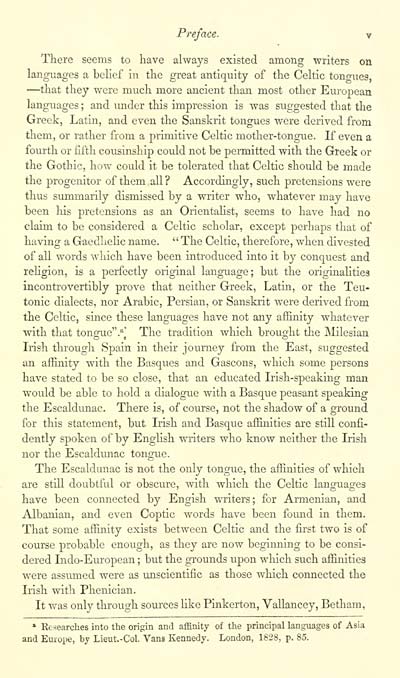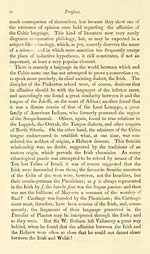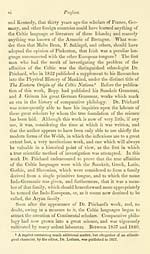Download files
Complete book:
Individual page:
Thumbnail gallery: Grid view | List view

Preface. v
There seems to have always existed among writers on
languages a behef in the great antiquity of the Celtic tongues,
— that they were much more ancient than most other European
languages ; and imder tliis impression is was suggested that the
Greek, Latin, and even the Sanskrit tongues were derived from
them, or rather from a primitive Celtic mother-tongue. If even a
fourth or fifth cousinship could not be pennitted with the Greek or
the Gothic, Iioav could it be tolerated that Celtic should be made
the progenitor of them all ? Accordingly, such pretensions were
thus summarily dismissed by a writer who, whatever may have
been Ms pretensions as an Oiientalist, seems to have had no
claim to be considered a Celtic scholar, except perhaps that of
having a Gaedlielic name. *' The Celtic, therefore, when divested
of all words which have been introduced into it by conquest and
religion, is a perfectly original language; but the originalities
incontrovertibly prove that neither Greek, Latin, or the Teu-
tonic dialects, nor Arabic, Persian, or Sanskrit were derived from
the Celtic, since these languages have not any afl&nity whatever
with that tongue" .*j The tradition which brought the Milesian
L-ish through Spain in their journey from the East, suggested
an affinity with the Basques and Gascons, which some persons
have stated to be so close, that an educated Irish-speaking man
would be able to hold a dialogue with a Basque peasant speaking
the Escaldunac. There is, of course, not the shadow of a ground
for this statement, but Irish and Basque affinities are still confi-
dently spoken of by English writers who know neither the Irish
nor the Escaldunac tongue.
The Escaldunac is not the only tongue, the affinities of which
are still doubtful or obscure, with which the Celtic languages
have been connected by Engish writers; for Armenian, and
Albanian, and even Coptic words have been found in them.
That some affinity exists between Celtic and the first two is of
course probable enough, as they are now beginning to be consi-
dered Indo-European ; but the grounds upon wliich such affinities
were assmned were as unscientific as those which connected the
Irish with Phenician.
It was only through sources like Pinkerton, Vallancey, Betham,
» Kesearches into the origin and affinity of the principal languages of Asia
and Emope, by Lieut.-Col. Vans Kennedy. London, 1828, p. 85.
There seems to have always existed among writers on
languages a behef in the great antiquity of the Celtic tongues,
— that they were much more ancient than most other European
languages ; and imder tliis impression is was suggested that the
Greek, Latin, and even the Sanskrit tongues were derived from
them, or rather from a primitive Celtic mother-tongue. If even a
fourth or fifth cousinship could not be pennitted with the Greek or
the Gothic, Iioav could it be tolerated that Celtic should be made
the progenitor of them all ? Accordingly, such pretensions were
thus summarily dismissed by a writer who, whatever may have
been Ms pretensions as an Oiientalist, seems to have had no
claim to be considered a Celtic scholar, except perhaps that of
having a Gaedlielic name. *' The Celtic, therefore, when divested
of all words which have been introduced into it by conquest and
religion, is a perfectly original language; but the originalities
incontrovertibly prove that neither Greek, Latin, or the Teu-
tonic dialects, nor Arabic, Persian, or Sanskrit were derived from
the Celtic, since these languages have not any afl&nity whatever
with that tongue" .*j The tradition which brought the Milesian
L-ish through Spain in their journey from the East, suggested
an affinity with the Basques and Gascons, which some persons
have stated to be so close, that an educated Irish-speaking man
would be able to hold a dialogue with a Basque peasant speaking
the Escaldunac. There is, of course, not the shadow of a ground
for this statement, but Irish and Basque affinities are still confi-
dently spoken of by English writers who know neither the Irish
nor the Escaldunac tongue.
The Escaldunac is not the only tongue, the affinities of which
are still doubtful or obscure, with which the Celtic languages
have been connected by Engish writers; for Armenian, and
Albanian, and even Coptic words have been found in them.
That some affinity exists between Celtic and the first two is of
course probable enough, as they are now beginning to be consi-
dered Indo-European ; but the grounds upon wliich such affinities
were assmned were as unscientific as those which connected the
Irish with Phenician.
It was only through sources like Pinkerton, Vallancey, Betham,
» Kesearches into the origin and affinity of the principal languages of Asia
and Emope, by Lieut.-Col. Vans Kennedy. London, 1828, p. 85.
Set display mode to: Large image | Transcription
Images and transcriptions on this page, including medium image downloads, may be used under the Creative Commons Attribution 4.0 International Licence unless otherwise stated. ![]()
| Early Gaelic Book Collections > Blair Collection > Celtic studies > (9) |
|---|
| Permanent URL | https://digital.nls.uk/75771281 |
|---|
| Description | A selection of books from a collection of more than 500 titles, mostly on religious and literary topics. Also includes some material dealing with other Celtic languages and societies. Collection created towards the end of the 19th century by Lady Evelyn Stewart Murray. |
|---|
| Description | Selected items from five 'Special and Named Printed Collections'. Includes books in Gaelic and other Celtic languages, works about the Gaels, their languages, literature, culture and history. |
|---|

